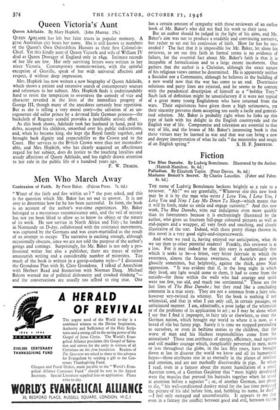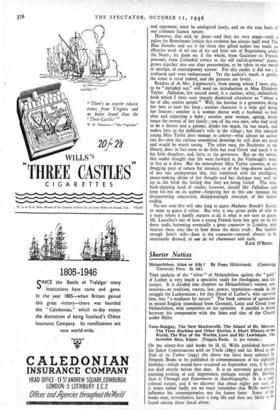Fiction
The Blue Danube. By Ludwig Bemelmans. Illustrated by the Author. (Hamish Hamilton. 8s. 6d.) Palladian. By Elizabeth Taylor. (Peter Davies. 8s. 6d.)
THE name of Ludwig Bernd/flans beckons brightly as a rule to a reviewer. "Ah!" we say gratefully, "Whatever else this new book may be it is by the man who wrote I Love You, I Love You, I Love You and Now I Lay Me Down To Sleep—which means that it will be fresh, make us smile and engage curiosity." And this new work, The Blue Danube, wins our indulgence even more quickly than its forerunners because it is enchantingly illustrated by the author, who gives us fourteen full-page coloured pictures as well as end-papers and a wrapper, all very fresh and touching, and closely illustrative of the text. Indeed, with these pretty things thrown in, this novel is a very good eight-and-sixpenceworth.
And when we read it, -having enjoyed our anticipation, what do
we say then to other read, readers? Frankly, this reviewer is at a loss. For it may indeed be that this story is authentically that which it seeks to be—a bitter, very bitter fairytale in which the sweetness, almost the fatuous sweetness, of Austria's past stirs ghostily sometimes, but helplessly, against the thick, gross Nazi oppression. "It was evident that if, in the long night in which they lived, any light would come to them, it had to come from the outside—for those within the walls who had courage and spirit were too few, too old, and much too sentimental." Those are the last lines of The Blue Danube ; but they read like a concluding comment in a true story. They are not a sentence from a fairy tale, however wry-twisted its whimsy. Yet the book is nothing if not whimsical, and that in what I can only call, in certain passages, an unbalanced manner. I am, admittedly, a poor judge of the whimsical or of the problems of its application to art ; so I may be alone when I say that I find it improper, in fairy tale or elsewhere, to treat the German nation, which brought our world to where it is now, as a breed of vile but funny pigs. Surely it is time we stopped pretending to ourselves, or even in bedtime stories to the children, that the worst of man and his blackest responsibilities come from his animalism? Those iron attributes of energy, efficiency, mad egotism and still madder courage which, inexplicably perverted in men, more or less throughout the globe, in the last fifty years, have brought down at last in disaster the world we knew and all its humanistic hopes—those attributes rise in us eternally in the planes of intellect and emotion, and are not markedly discoverable in pigs. So when I read, even in a fantasy about the recent humiliation of a small Austrian town, of a German Gauleitea• that "most highly developJ were the muscles that pressed his buttocks together when he stood at attention before a superior " • or, of another German, just about to die, "his well-conditioned donkey mind for the last time projected the picture of his idol before him, and, babbling its name, he died " —I feel only outraged and uncomfortable. It appears to me that even in a fantasy the conflict between good and evil, between victim
and oppressor, must be analogised justly, and on the true basis of our common human nature.
However, that said, let those—and they are very many—with a palate for Bemelmans (which this reviewer has always had) read The Blue Danube and see if for them this gifted author has made an effective work of art out of his sad little tale of Regensburg under the Nazis let them see if the whole, from Gauleiter to French prisoner, from Cathedral towers to the old radish-growers' pump, grows together into one clear presentation, to be taken in one mood or anothgr, of contemporary sorrow. For this reader it did not ; it confused and even embarrassed. Yet the author's touch is gentle, the scene is vivid indeed, and the pictures are lovely. Readers of At Mrs. Lippincotes, from among whom I have, alas, to be "included out," will -need no introduction to Miss Elizabeth Taylor. Palladian, her second novel, is a curious, witty, melancholy book which I have seen sharply dismissed elsewhere as "about a lot of idle, useless people." Well, the heroine is a governess, doing her best to earn her keep ; another character is a little girl doing her lessons ; another is a woman doctor with a husband to look after and expecting a baby ; another poor woman, ageing, keeps house for several of her family ; one of the two men, who had tried to be a doctor and a painter, drinks too much, far too much, and makes love to the publican's wife in the village; but this talented young Miss Taylor does manage to convey—what almost no authot can do—that the curious anatomical drawings he still does are good and would be worth seeing. The other man, the Rochester in the library, does in fact seem to do little but read Greek and teach it to his little daughter, and, later, to the governess. But on the whole, this reader thought that life went forward at the Vanbrugh's more or less as it does. But the atmosphere Miss Taylor conveys, of the dragging pace of nature for instance, or of the long-drawn sadness of any one tutithportant day, this combined with the intelligent, pause-making idiom of her thought and her dialogue may well set up in the brisk the feeling that they are being fooled. The non- back-slapping kind of reader, however, should like Palladian and keep his eye on its author—forgiving her in this one instance the
disappointing concession, disappointingly executed, of her happy ending.
No one over five will take long to guess Madame.Benoit's Secret, or want to guess it either. But why it was given pride of title in a story where it hardly matters at all is what is not easy to guess. Mr. Lascelles's tale of how a young French farm boy gets on in the dress trade, becoming eventually a great couturier in London, may interest those who like to hear about the dress trade. But funnily enough Jean's wife—Jean is the couturier—seemed always to be atrociously dressed, in eau de nil charmeuse and such.
KATE O'BRIEN.































 Previous page
Previous page